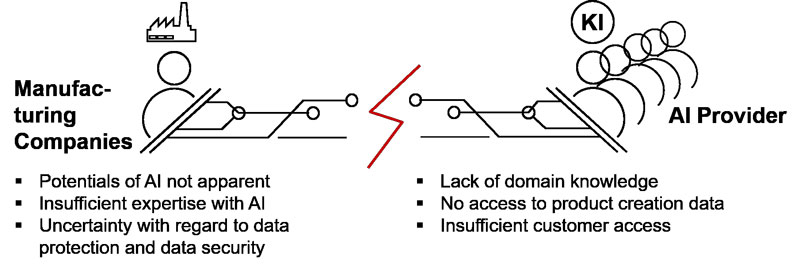by Ruslan Bernijazov (Fraunhofer IEM), Leon Özcan and Roman Dumitrescu (University of Paderborn)
Artificial Intelligence (AI) is one of the key technologies of the future and can provide substantial efficiency and productivity gains for product creation. However, manufacturing companies often lack sufficient expertise to take advantage of AI’s potential. The AI marketplace will address this challenge by creating an ecosystem for artificial intelligence in product creation.
Artificial intelligence (AI) is one of the key technologies of the near future. According to a recent policy on AI by the European Commission, AI has become “…an area of strategic importance and a key driver of economic development.” [L1]. A recent study by the Bitkom association also revealed that 78% of German companies see AI as a decisive technology for the competitiveness of German industry in the future [L2]. AI offers great potential to improve efficiency and productivity, especially for knowledge-intensive activities, like product creation. For example, AI solutions can automate engineering activities, support engineers in their daily work, and automatically discover new insights from the various data sources in engineering [1, 2]. This can lead to an increase in development capacity, shorter development times and contribute to new innovations in product creation.
Although AI holds great potential for product creation, manufacturing companies are being slow to adopt it. We investigated the impediments for adoption [3] by conducting interviews, workshops and surveys with manufacturing companies as well as with AI solution providers. The main challenges that we identified are summarised in Figure 1.
The main challenge for manufacturing companies is often a lack of AI expertise to help the company identify and utilise the potential of AI. Another important concern is uncertainty around data protection and data security measures employed by AI solution providers, which results in low levels of cooperation between manufacturing companies and AI providers. In turn, AI solution providers lack the required domain knowledge to assess how their solutions might benefit product creation. Moreover, AI solution providers often suffer from insufficient access to engineering data to train and test their solutions as well as from poor access to decision makers in industry.
To tackle these challenges, we initiated the project “AI Marketplace” with the goal of creating an ecosystem for artificial intelligence in product creation in the scope of the competition "Artificial intelligence as a driver for economically relevant ecosystems" of the Federal Ministry for Economic Affairs and Energy in 2019. The idea of the project is to build the ecosystem around a digital platform that brings together AI experts, AI developers and manufacturing companies to promote cooperation and joint innovations. The project started in 2020 and has a total runtime of three years. The consortium consists of 18 partners from academia as well as industry and is supported by a strong network of associated partners.

Figure 1: Impediments to the adoption of AI in product creation.
We plan to develop the platform in several stages:
Development stage 1: Intelligent matchmaking
In the first development stage, we focus on matchmaking between manufacturing companies and AI solution providers in order to leverage the realisation of concrete AI use cases for product creation. Manufacturing companies and AI solution providers will be able to describe their main challenges and competencies in their own domain language by means of profile pages on the platform. Based on this information, the platform will suggest project compositions and potential partners. Moreover, the platform will provide a variety of interaction mechanisms, like open challenges and makeathons, in order to support cooperation between manufacturing companies and AI solution providers.
Development stage 2: Protected data space for product creation
The goal of the second development stage is to support the exchange of engineering data between manufacturing companies and AI solution providers by means of a protected data space. This data space will employ existing technologies of the involved partners in order to allow manufacturing companies to share their data in a controlled way. Moreover, we will provide best practices for processing of engineering data to support the development of AI solutions for product creation.
Development stage 3: App store for AI solutions in product creation
The third development stage will extend the functionality of the platform by providing mechanisms for the exchange of ready-to-use AI solutions and services. This will allow solution providers to distribute existing AI solutions directly over the platform to a broad range of potential customers. Moreover, the platform will provide tools and guidelines, like frameworks, libraries, and development methodologies to support the development of AI solutions for product creation.
Development stage 4: Dynamic configuration of AI
The fourth development stage will additionally support a dynamic configuration and integration of existing AI building blocks based on company-specific requirements. This will allow manufacturing companies to combine the solutions of different providers based on their specific needs. For this development stage we will build upon the results of the collaborative research centre (CRC) 901 which has been developing concepts for an on-the-fly configuration of IT-services since 2011 [L3].
Ecosystem services
We are also developing a variety of general services for the ecosystem, like potential analyses and quick-checks to support the onboarding of new members of the ecosystem. More information about the available services can be found on our webpage [L4].
The project AI marketplace is funded by the German Federal Ministry for Economic Affairs and Energy [grant number: 01MK20007A]. The responsibility for the content of this article lies with the authors.
Links:
[L1] https://ec.europa.eu/digital-single-market/en/artificial-intelligence
[L2] https://www.bitkom.org/Presse/Presseinformation/Digitalisierung-kommt-in-den-deutschen-Unternehmen-an
[L3] https://sfb901.uni-paderborn.de/
[L4] https://www.ki-marktplatz.com
References:
[1] L. Bretz, et al.: “Engineering Intelligence - KI-Kompetenz wird für Entwickler immer wichtiger”, 2018. https://www.it-production.com/produktentwicklung/ki-kompetenz-entwickler/ (accessed: 12.05.2020).
[2] T. McDermott, et al.: “AI4SE and SE4AI: A Research Roadmap”, 2020, in: INSIGHT Magazine.
[3] R. Dumitrescu, M. Drewel, T. Falkowski: “KI-Marktplatz: Das Ökosystem für Künstliche Intelligenz in der Produktentstehung”, in: ZWF – Zeitschrift für wirtschaftlichen Fabrikbetrieb.
Please contact:
Leon Özcan, University of Paderborn, Germany










